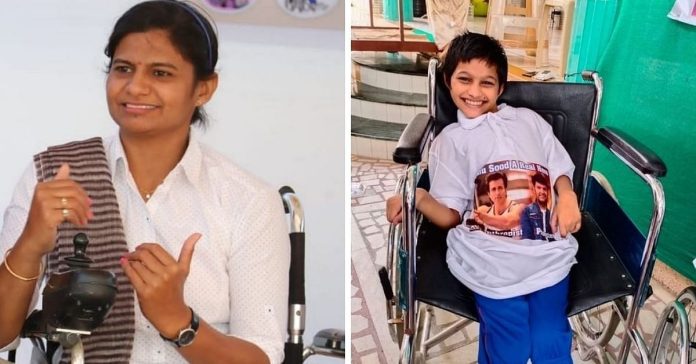
Outcasted by Society, How a Disabled Gujarati Woman used her Savings to Serve Others
Date:

Share post:
When Neelam Parmar of Junagadh was born with a serious handicap that paralyzed 80 percent of her body, she and her family were pushed to the outside of society. Her relatives would indulge in baseless and unjustified comments, and her school mistreated her while children her age humiliated her.
Despite a difficult childhood and traumatic experiences, Neelam claims she doesn’t really hold anyone responsible. Instead, she desired to use her life experiences to help others and create a change. As a result, she decided to establish a non-governmental organization (NGO). NGOs are a huge help to society. They place a strong emphasis on humanitarian issues, development assistance, and long-term development. NGOs have also played a significant role in promoting human-centered development methods on their own, without the assistance of governments, and have emerged as a major force in the corporate social responsibility movement.
With the aid of her father and sister Rekha, she founded Santvan Viklang Vikas Mandal in 2012 to ensure a healthy environment for children and adults with disabilities aged nine months to 51 years.

The NGO provides for all of their needs, including food, medical treatment, basic education, and housing. To cover their everyday costs, Neelam and Rekha rely on their personal funds and donations from others.
“When I was growing up, there was a lack of awareness and basic knowledge about disabilities. Of course, thanks to the internet, people can now educate themselves, but there is still much to be done. The NGO is my small gift to those who deserve all of the love and care that the world has to offer. More significantly, we work hard to maintain people’s self-confidence and self-esteem,” Neelam explains.
Coping with 40 children and adults who have undergone mental and emotional trauma is difficult, according to Neelam, and requires a lot of patience. She explains how she stayed strong and driven in the face of adversity.
So, How Did It All Start?
According to Neelam, the two sisters were motivated to launch an NGO after a medical trip to Rajasthan in 2009.
“We had been there for over a year since Neelam had to undergo many surgeries.” We spent the majority of our time at the hospital, where we witnessed others in similar situations. We even started assisting the patients with simple tasks such as collecting water or setting up a chair. While doing so, we both realised that serving others was our true calling,” adds Rekha, who holds a master’s degree in social work.
Girls with cerebral palsy, Down syndrome, autism, and other cognitive and orthopaedic problems are housed at the NGO. In the vast majority of these situations, their parents abandoned them in a hospital. Other organisations frequently approach the NGO, which admits persons based on the severity of their condition or disability.
“If the children are excessively hyperactive or unable to articulate themselves, we may turn them away to the NGO who approaches us.” However, for some, we are willing to break the rules. We received a four-month-old infant with down syndrome from Jabalpur just five months ago. Her mother had died, and her father had left her after discovering the illness. “This crushed our hearts, so we decided to keep her here for the rest of her life,” Neelam adds.
The sisters are highly conscientious about sticking to a regular routine that keeps them physically and psychologically fit. Bathing, three meals a day, mental and physiotherapies, craft-based activities, tv time, and dancing sessions are all part of the girls’ daily routine, and they are given the highest amount of care. They’re also taken to the hospital on a regular basis for checkups.

While building trust and a bond with each of them is the most challenging element, it is also the most rewarding, according to Rekha. “We study their patterns and behaviours to determine their requirements, such as hunger, thirst, and pain.” They wouldn’t even let us touch them at first. So, we must begin by grasping pinky fingers or handkerchiefs held by both of us from opposite ends. Neelam and I alternate nights of being up.”
Conclusion
Differently abled persons are unable to rise above their position and achieve their full potential due to social and physical restrictions imposed by society. The social stigma associated with irreversible mental diseases leaves people hopeless and isolated from an uncaring community. Most families are depressed because they require particular care, which may necessitate additional financial resources. Especially in a country like India, where the majority of the population comes from a rural background and is striving to get by.
Santvan Viklang Vikas Mandal, founded by these two sisters, is one of many NGOs and organizations aiming to change this thinking and make the world a more welcoming place for everyone. So, you can do your bit to change society’s perspective by donating to NGOs for the differently-abled.
